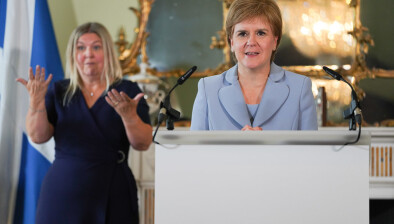Housing crisis set to deepen even further as Scottish Budget passed

HFS director of policy Fionna Kell
The passing of the Scottish Budget 2024/25 at Holyrood yesterday will perpetuate housing inequality across the country and limit the number of new homes coming forward across all tenures, sector body Homes for Scotland (HFS) has warned.
The Budget includes more than £1.3 billion for the Wellbeing Economy, £1bn for the road network, around £2.7bn for public transport and active travel, almost £556 million in the Affordable Housing Supply Programme, more than £400m for energy efficiency upgrades and to promote the circular economy, and an increase of £128m to the education and skills budget.
With a cut of 27.7% to the Housing and Building Standards Budget and further cuts of 26% and 43% to the Affordable Housing Supply Programme and Planning Budget respectively confirmed, HFS director of policy Fionna Kell said: “Whilst we welcome the Deputy First Minister’s commitment that housing will be treated with priority should further funds become available as a result of announcements by the Chancellor next week, the Budget passed today will only serve to deepen the housing inequality being felt across the country and risks losing the significant socio-economic benefits that come through increased home building across all tenures.
“The cuts come at a time when multiple Local Authorities have declared housing emergencies and recent independent research has shown that there are 693,000 Scottish households facing at least one form of housing need.
“Instead of cutting housing budgets, now is the time to maximise the wide-ranging socio-economic benefits offered by ensuring Scotland has the homes it needs to meet the needs of its people.”
SFHA chief executive Sally Thomas said the Budget plunges Scotland ever deeper into a housing crisis.
She added: “The decision to slash nearly £200m from the affordable housing budget underlines that the Scottish Government’s support for social housing in Scotland is unravelling, and this will have real consequences for tackling poverty and homelessness across Scotland.
“The news will also serve as devastating news for the 250,000 people waiting on a social home and the 10,000 children growing up in temporary accommodation.
“Safe, warm, affordable housing is a basic human right. With this Budget, we are undermining that right.”
Callum Chomczuk, national director of CIH Scotland, added: “The decision to stick with a £196 million cut to the affordable housing supply budget is devastating for the almost 10,000 children in temporary accommodation; the 30,000 households assessed as homeless and everyone else in Scotland who needs a safe affordable home.
“Restoring the budget could have built around 2,000 social homes, which would have supported those in the greatest need. Instead, we will see our housing emergency exacerbated and extended.
“To deliver on the promise of the government vision for the housing sector we need to see an action plan and funding to match our shared ambitions. Today’s decision by Parliament will make it harder tackle homelessness, cut poverty, reduce carbon emissions, and address our housing need.”
The Royal Town Planning Institute (RTPI) said the budget cut will have a tangible impact on housing delivery across Scotland.
Dr Caroline Brown, director of RTPI Scotland, said: “Cuts agreed yesterday to the Scottish social housing budget signify a significant setback with tangible consequences for communities across the nation.
“Central government funding is crucial for the delivery of new housing. The Scottish Government’s ambitious housebuilding goals are already lagging behind, and these cuts will exacerbate the situation, placing additional pressure on Scotland’s already overworked and overstretched local planning authorities.
“This budget cut will have a tangible impact on housing delivery across Scotland, and create further tensions in local authority budgets. Our research has found that the budget for planning services has already been slashed by 38% between 2010 and 2022 and a quarter of planning department staff was cut between 2009 and 2022. At the same time, new duties and responsibilities are falling on planning authorities, requiring them to do more with less.”
The Scottish Government said its Budget ensures funding can be targeted towards the missions of supporting public services, growing the economy and tackling poverty.
Spending commitments include:
- £13.2bn for frontline NHS boards, over £1.5bn for policing and nearly £400m to support the fire service
- Over £5bn to help create jobs, support businesses, aid the transition to net zero and fund public transport to provide viable alternatives to car use
- £6.3bn for social security benefits, £200m to help tackle the poverty-related attainment gap and £1.5m to cancel school meal debt
- Over £14bn for local authorities – the highest settlement yet delivered for local government.
Deputy First Minister and finance secretary Shona Robison said: “I am pleased that Parliament has approved our Budget, allowing us to enact our spending plans in the face of a deeply challenging financial situation. This is a Budget which stays true to our progressive values: investing in services, growing our economy, protecting vulnerable people and tackling the climate emergency.
“We have taken decisions which prioritise funding in the areas that have the greatest impact on the quality of life for the people of Scotland – despite the challenges caused in large part by the UK Government’s failure to invest in public services and infrastructure. Our block grant funding from the UK Government has fallen in real terms since 2022-23. Our capital spending power is due to contract by almost 10 per cent in real terms over five years – that’s around £1.6bn in total, equivalent to the cost of building a large hospital.
“I have written to the Chancellor urging him to change course, using next week’s Spring Budget to increase funding for public services and infrastructure instead of cutting taxes.”
However, COSLA’s resources spokesperson Councillor Katie Hagmann said the Budget is not good for communities across Scotland.
Councillor Hagmann said: “Whichever way you cut it, this is not a good Budget for Scottish local government or communities that we represent. Councils are having to make budget decisions about a Council Tax freeze without clarity as disappointingly the potential additional funding, which is dependent on Westminster processes and the UK Spring Budget, isn’t yet known.
“If we are serious about tackling inequalities in Scotland, investing in prevention, and promoting inclusive growth we must be properly resourced. Local government holds the key to deliver the essential front-line services that enables this to happen.
“We remain committed to our shared priorities with Scottish Government; Tackling Poverty, A Just Transition to Net Zero and Sustainable Public Services however, this Budget makes those outcomes much harder to achieve.”
STUC general secretary Roz Foyer said: “In passing this budget, the Scottish Parliament are passing on cuts that will be deeply damaging to the social fabric of our communities and have let the Scottish Government off the hook. This Budget significantly cuts funding for local government, further and higher education as well as cutting the capital investment needed to tackle both the climate and housing crises.
“Make no mistake about it: jobs and livelihoods will be impacted and our movement won’t stay silent as the cuts hit.
“Despite progressive steps to introduce the new £75,000 tax band, called for by the STUC, government ministers have not done enough to plug the gaps from the UK Government’s reduction in funding. The Scottish Government’s Council Tax freeze has made a bad problem worse - restricting revenue for crucial public services while disproportionately benefiting the rich.
“More must be done to raise the vital revenue needed to improve our public services and deliver a greener, more equal economy. Through our tax proposals, we’ve shown that the Scottish Government can stave off the worst of Tory Westminster austerity. It’s entirely within the powers of our Parliament and the Scottish Government to raise an additional £3.7bn of extra revenue. All we need to see is the political will to achieve it.
First Minister Humza Yousaf highlighted his government’s commitment to tackling child poverty and helping families struggling with the cost of living.
Calling directly on the Chancellor to take action to provide further targeted support in the upcoming Spring Budget, the First Minister said: “Tackling child poverty is a central mission for the Scottish Government. That’s why in the year ahead we will invest a record £6.3bn in social security benefits, including the game-changing Scottish Child Payment and six other benefits only available in Scotland. This is a full £1.1bn more than we receive for social security.
“However, most of the powers to tackle poverty and the cost of living remain in the UK Government’s hands. The Spring Budget is an opportunity for the Chancellor to take action to provide further targeted support for people who are struggling.
“We have made repeated calls to make social security fit for purpose - by introducing an Essentials Guarantee, to ensure Universal Credit is always enough to meet people’s basic needs - and by removing the punitive two child limit and so-called ‘rape clause.’ This damaging policy restricts the amount of support available to some of our most vulnerable people and disproportionately affects women and children.
“We will continue to do everything within the scope of our powers and budget in order to meet our statutory child poverty targets and will be relentless in that focus, but it is only with the full economic and fiscal powers of an independent nation that Ministers can use all levers other governments have to tackle inequalities.”







